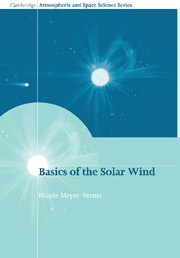Book contents
- Frontmatter
- Contents
- Preface
- 1 The wind from the Sun: an introduction
- 2 Tool kit for space plasma physics
- 3 Anatomy of the Sun
- 4 The outer solar atmosphere
- 5 How does the solar wind blow?
- 6 Structure and perturbations
- 7 Bodies in the wind: dust, asteroids, planets and comets
- 8 The solar wind in the Universe
- Appendix
- Index
Preface
Published online by Cambridge University Press: 22 October 2009
- Frontmatter
- Contents
- Preface
- 1 The wind from the Sun: an introduction
- 2 Tool kit for space plasma physics
- 3 Anatomy of the Sun
- 4 The outer solar atmosphere
- 5 How does the solar wind blow?
- 6 Structure and perturbations
- 7 Bodies in the wind: dust, asteroids, planets and comets
- 8 The solar wind in the Universe
- Appendix
- Index
Summary
Why chase the wind?
J. Cocteau, AntigoneFor science-fiction writers and some space engineers, the ‘wind from the Sun’ is a wind of photons – the light we see, whose pressure might allow solar sailing and drive space windjammers through the solar system. Yet the Sun blows another kind of wind, made of material particles, whose importance is considerable since it bathes the whole Solar System and shapes all planetary environments.
This wind has many faces. To the layman, it sounds rather mysterious, being made of a strange medium, a plasma: the fourth state of matter. Not only do its tempests affect our everyday technology by disrupting communications and power stations, but it drives two bewildering sky displays: comet tails and auroras. To the space scientist, in contrast, the solar wind is a close companion, and the challenge is to explore and tame a jungle where his or her instruments reveal a strange fauna. The plasma physicist is delighted to find there a number of stunning surprises and extreme properties which are virtually impossible to simulate in the laboratory. And to the astronomer who is trying to understand how cosmic bodies – from planets and comets to stars and galaxies – eject particles into space, it is the only stellar wind that can be studied in detail.
The solar wind has been explored in situ by numerous space probes, from inside Mercury's orbit to far beyond the distance of Neptune, and, quite recently, at virtually all heliocentric latitudes.
- Type
- Chapter
- Information
- Basics of the Solar Wind , pp. xiii - xivPublisher: Cambridge University PressPrint publication year: 2007



